Securing boards inside enclosure
|
The only fault that has ever occurred to any of my pedals is when the board comes loose and grounds out on the enclosure.
I currently velcro the board to the underside of pots or the inside of the enclosure depending on room, but I guess the velcro can dry out sometimes. So i'd like to know, what methods do you guys use? Cheers Dave |
Re: Securing boards inside enclosure
|
I use small barrel nuts as stand offs and secure them to the open hole at the corner of the vero. One is usually enough.
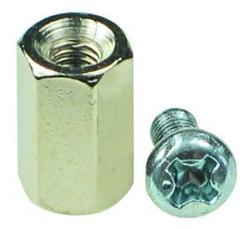
|
|
Interesting, do you have to drill a hole in the enclosure to mount the nut?
|
Re: Securing boards inside enclosure
|
I build my own enclosures. Usually out of steel, so I can tack a screw in there to act as a stud for the standoff, but sometimes I drill for it. depends on what I am after.
If you didn't want it to show, you could make a little plate out of plastic or metal to put your stud through. this in turn could be held down by the pots, or the footswitch etc. inside of the enclosure. In the past, I would bend and drill a small piece of sheet metal and make a little tab to bolt the corner(s) of the vero to and either use the footswitch or pots to hold it down solid. |
|
I've tried just about every method going, but had issues and was ultimately unhappy with all of them, until I hit on using White Tack to hold the boards to the back of the pots. Works a treat!
|
|
Since I'm no artist like some builders who can put a vero circuit so that the components stand up and make the wires neat and pretty much invisible. I take my hat off to those guys.
I have built a few with that method, but only where there's space in the enclosure to hot glue it to the enclosure (not the pots). I've built a few pedals on tagboard where I hot glued them to the pot and that turned out great. What I do (because I build many pedals every single day and I have to do it quickly, efficiently but still well) is that I wire the board upside down (easier and more space) and when it's all ready I use PVC tape. Yes I said it: tape. I put a few strips that go with the vero strips until it covers the board. Then I do the same in the other direction (agains the vero strips). I make the ends of the tape go about 1-2 cm down from the edges of the board. Then I take more tape and tape around the board. This keeps the ends safe and it will pretty much never come loose still look neat and there's no chance in hell that the circuit will conduct to anything. I also use super good wires that are sturdy so it's not moving anywhere. For more reliability, I make it stick to the lid of the enclosure. Since the circuit is really facing up when the pedal is down on a board, it's sitting on the lid (sticking to it) and won't ever go anywhere. I've build hundreds of pedals (about 400 in 2013) and I hardly ever have any problems. Sidenote: I build my standard pedals on PCB where the board is soldered to the footswitch and I love it. I wish I could do it with vero! See why I love building on PCB: 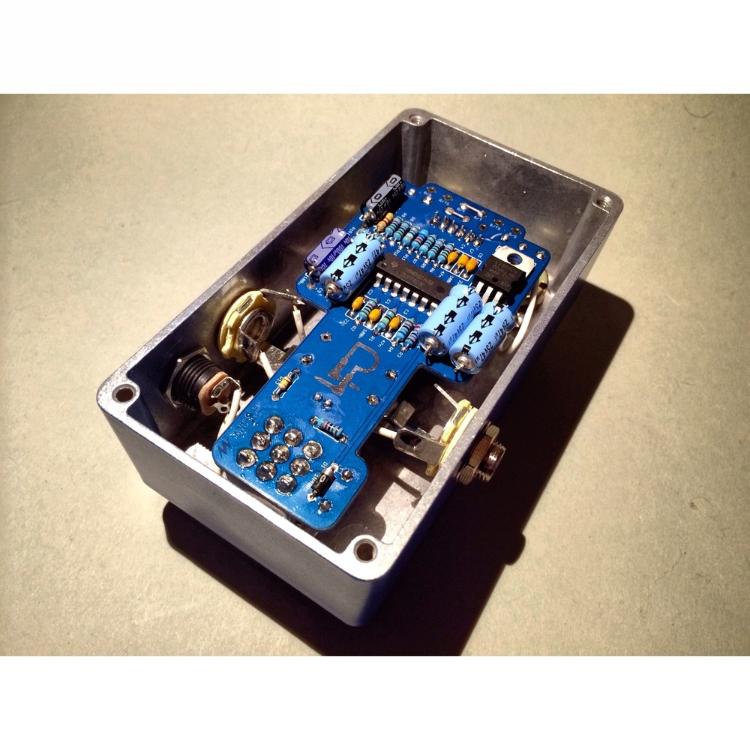  Don't get me wrong, I still love vero too! 
www.pedalprojects.com
www.facebook.com/pedalprojects |
|
Here's an example of when I hot glue the circuit to the enclosure:
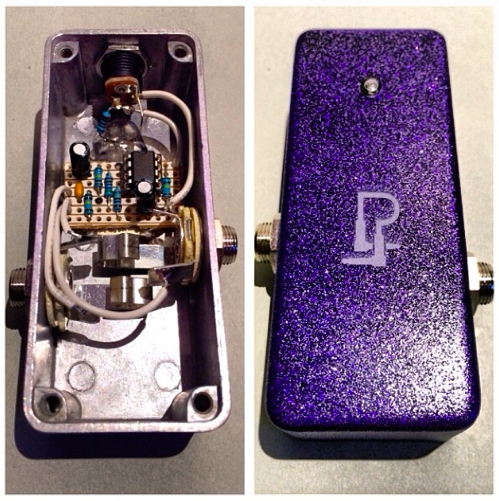 Just make sure to use it generously so that it sits on the glue, not the enclosure. Here's an example of when I use tape on the veroboard: 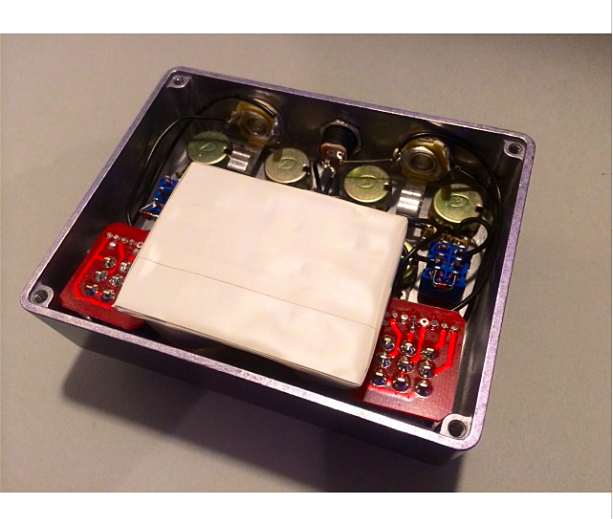
www.pedalprojects.com
www.facebook.com/pedalprojects |
|
I think we have a winner, thats a great idea Geiri, you've convinced me to give it a go. It is frustrating when a board comes loose, as I can test and make sure its working before I post, one good knock in the post and then the board shorts and the pedal doesn't work.
Cheers Dave |
|
In reply to this post by Dave
Here is how I do it, for ex on a plexidrive
 I usually use Tayda pots which have plastic condoms which are great for isolation. For other pots I put some tape on their back as you can see. I use the wires to isolate the board from the enclosure on the sides And before closing the box I put a piece of foam on the board to secure it Geiri, your finnish pcbs look absolutely awesome 
|
|
In reply to this post by Dave
A bit of clear (similar to the stuff that protects mobile phone screens) film on the base plate to stop anything shorting then some mammoth tape on the bottom of the vero. Warning, once it sticks you will literally have to tear it apart to remove it. I actually snapped a veroboard trying to remove it.
http://www.ebay.co.uk/itm/Everbuild-Mammoth-Powergrip-double-sided-tape-12mm-x-2-5m-/121179750002?pt=UK_Crafts_Cardmaking_Scrapbooking_Glue_Tape_EH&hash=item1c36e03e72 And something like this on the base plate to stop components touching it and shorting http://www.ebay.co.uk/itm/Quality-Clear-Self-Adhesive-Book-Cover-Film-Transparent-Exercise-Note-School-/380662302998?pt=UK_Stationery&var=650105319905&hash=item58a13dc916 |
Re: Securing boards inside enclosure
|
In reply to this post by Dave
I'm certainly no expert (30 plus builds) and too have had shorting problems with the vero rattling round an enclosure but in the last 5 builds I have found a solution that works great for me.
I cut out some packing foam the same size as the vero and lay it on the pots, then glue some to the lid of the enclosure. I essentially sandwich the circuit between these 2 bits of foam that not only insulate from shorts but also act as a shock absorber. The handy thing is that the foam is so thick it holds the circuit in place. 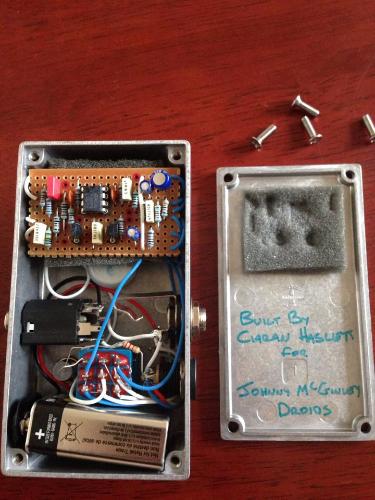 If the vero is 21 wide and I can't fit the wires down the side I use some electrical tape and tape the sides of the enclosure to prevent shorts on the vero edge 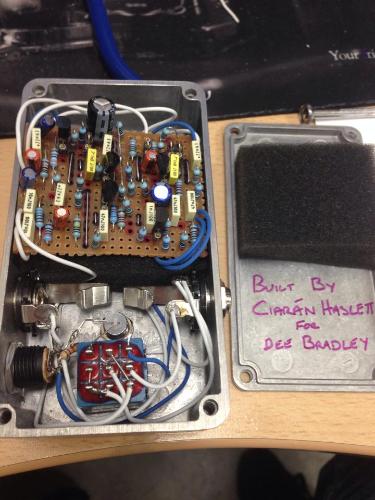 Still learning but I haven't had to open the last 5 yet. Hope this gives you ideas. Ciaran |
|
In 1590B there is theorically no problem with 21 columns veros to fit the wires on the side. I even like it because it's press fit and holds everything in place by itself
Here is a Klon which is 21x26 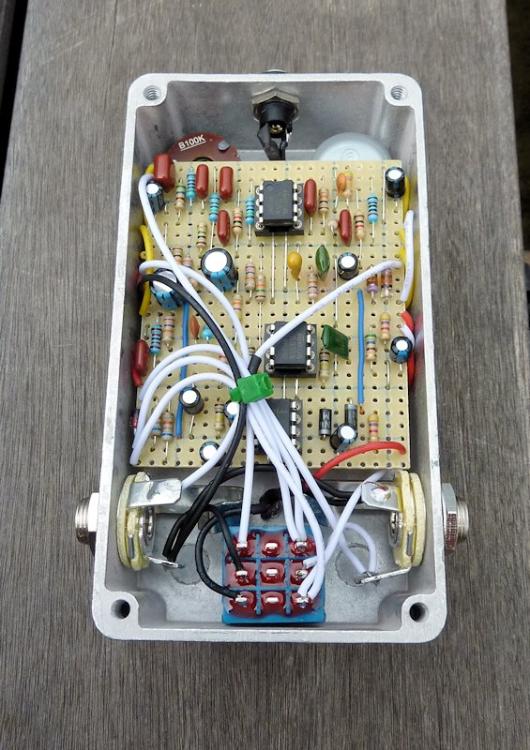
|
|
Superb suggestions guys, I love the foam packing idea too, I might give that a go as well. Brilliant stuff guys, this is the reason places like this are s great, because there are so many different answers to this one question that one of them has to work!
Cheers all! Dave |
|
In reply to this post by Dave
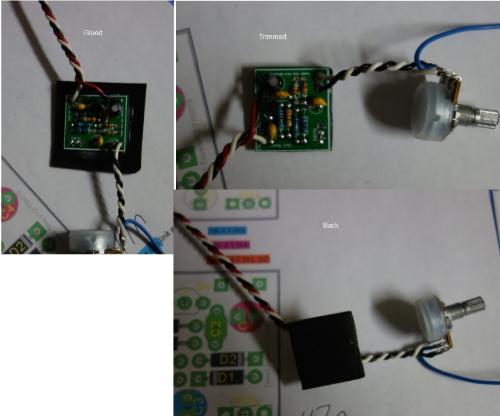 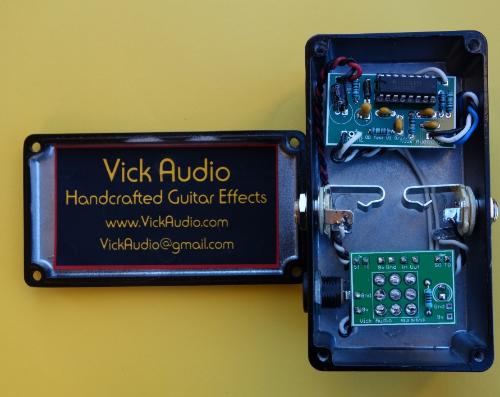 I use a self adhesive craft foam I got from walmart on the bottom of my boards, I do not trust the adhesive so use a hot glue gun to secure it in place. I then trim to size with scissors once the glue cools. I then cover the enclosure bottom plate with a vinyl label sticker. The sticker is made from the same stuff I use for my enclosure top labels http://www.papilio.com/inkjet%20waterproof%20adhesive%20film%20media.html I used to glue a business card to the base plate to prevent shorting |
«
Return to Open Chat
|
1 view|%1 views
| Free forum by Nabble | Edit this page |

